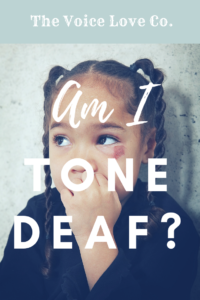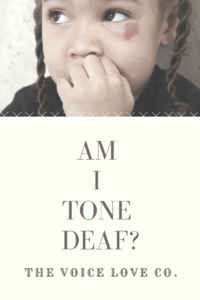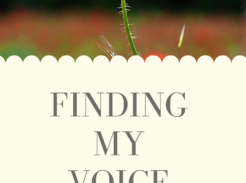“What do you do if you’ve been told you are ‘tone deaf’ your entire life?”
The question was barely audible, asked during a break by a student in a group voice class I was teaching to a troop of actors. This student had spent most of the class time so far that semester casting sheepish glances around the room, visibly uncomfortable at the thought that their fellow actors might actually hear them, their shame on parade for the world to see.

Are you REALLY tone deaf?
Only around 5% of the population actually suffer from what experts call ‘amusia’, which is defined as a clinical cognitive impairment. It basically means that the brain cannot process musical sounds properly to make sense of them. But read that number again. That is 5% of 7.7 BILLION people!
Are you tone deaf? Hardly. What is MORE likely is you struggle to stay in tune when you sing because you lack musical training and you lack confidence. And the reason you have neither of these? Simple. You were told you were tone deaf your whole life. Why would anybody seek out musical training or gain confidence in singing when they don’t believe they can? It shuts you down from even trying.
While tone deafness is quite uncommon amongst the population statistically speaking, the tendency by the ignorant among us to label a child whom the adult would simply rather not hear is a problem I’ve run into more times than I can count. It breaks my heart. The adult student comes in to see me for the first time, absolutely terrified. They can barely speak about it above a whisper as they recall their wounding. A wounding they’ve often carried for decades. There are often tears and an embarrassed, “I don’t know why I’m crying!” as their story pours out.
It is RARE
In all my years of voice coaching, I can count on one hand the number of actual tone deaf people I’ve come across and not even use all of my fingers. Please hear me when I say it again for the people in the back: Tone deafness is RARE!
What I have found more common is that people’s voices have been silenced by over-worked, exhausted adults who just wanted some peace and quiet or other kids who were flat out being jerks. It had nothing to do with the child’s actual singing ability and everything to do with simply shutting them up at the moment.
But if you’ve been told this, either once or repeatedly, what do you DO about it?

Find Your Voice
If you have been told you are tone deaf, would you please do something for me? Start singing! But be aware that there is a little strategy to this singing thing. Nothing major, mind you. The voice is an instrument you can grab hold of, I promise. Keep this in mind as you start: When you are very first starting to find your voice, you will notice you have two very distinctive sounds. Your low voice, which can feel comfier and sounds more full, and your high voice, which feels and sounds thin and wimpy. For you, I’m willing to bet money that both sound terrible in your own head. That is NORMAL, but let’s set that issue aside for a moment, okay?
Breathe In, Breathe Out
The first thing you can do is not even try to actually sing anything, but rather just breathe. Sit comfortably in a quiet room and focus on your breathing, filling your lungs from bottom to top. Don’t allow the shoulders and collar bone to raise. Just breathe in through the nose, letting your belly be soft so it can move outward as you breathe in. Let your ribs swing out and around, and filling up with air only to just under the breast bone. Let yourself relax with each exhale, especially if there is a lot of emotional tension surrounding your voice.
Hummmmmm…
Then, just start to do what would be similar to stretching in the body before a workout. Hum.
Place the palms of your hands on both sides of your face, the heel of the hand on the jawline, your fingers resting gently on the temples and into the forehead. Keeping your breath relaxed and deep, let the voice rest on the breathing you are doing as you hum. It should be almost like an “Om” you would hear in yoga class. Feel the resonance vibrating around in your head. Notice the vibration in your face. Can you sense it in your body? Breathe and hum gently like this until it feels less foreign to be making a sound.
Now, let’s bend the pitch of the hum a bit. Keeping your hands flat against the sides of your face, continue to hum lightly and gently from your low voice into your high voice like you are going up a roller coaster. Notice what your hands are feeling on either side of the face when you do this. There may be large breaks in the ‘tracks’ of your vocal roller coaster as you go up. Those are normal. Just ignore those, please. Gently let the voice jump over those as it goes up into the wimpy high voice. Keeping the tracks as connected as possible, gently hum back down to the low voice. You might notice the voice jumps the tracks in the same place going back down. Now stop and take a supported, deep breath, filling the lungs from bottom almost to the top and hum up and down the roller coaster again. Doing this repeatedly will help your voice loosen up.
It is a process
This is the first baby step toward trying to sing. If you are a person who has been shut down for years and haven’t allowed yourself to try singing, take this first step of breathing and humming seriously and camp here, repeating daily until you feel more comfortable hearing your own voice and until the voice loosens up. If you continue to feel uneasy with the sound you are hearing in your head (again, NORMAL!), here is an important point to remember:
It is time to show up as the best version of yourself…
for YOU!
Be the person you most need in your life as you face your wounding about your voice head on. You may be questioning why in the world you feel compelled to start singing now and be tempted to quit. Be gentle with yourself in this process and watch what you say to yourself. Make sure that when you hear the ugly words you’ve believed for so long, “You are tone deaf! Stop this craziness immediately!”, that you are ready with a message to counteract that. Literally tell yourself things like: “You are safe. You can try this. Being a beginner is a good thing. Everything is okay!”
The process of finding your voice when you’ve been told you don’t have one takes time. But if it is a desire of your heart to learn how to sing or act or be a powerful speaker, then it is worth the investment of time. You CAN do it! Start TODAY!
ONLINE VOICE COACHING AVAILABLE!




Leave A Comment